Richard Henry Pratt informs A. O. Hyde that his son-in-law Lieutenant George LeRoy Brown has been using leave of absence from his post in Dakota to serve as the disciplinarian for the male students at the Carlisle Indian School but will have to return soon. As Pratt thinks this would be a monumental loss for the school, he informs Hyde that he'…
Trowbridge, R. E.
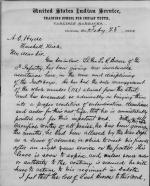
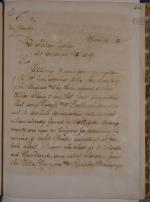
Letter from Commissioner of Indian Affairs R. E. Trowbridge to Rev. Sheldon Jackson informing him that plans are in motion to for Lt. Brown to travel West and secure children from the Ute, Navajo, and Pueblo Tribes. Trowbridge was responding to a recommendation from Jackson dated March 1 to recruit from the Southwest Tribes.
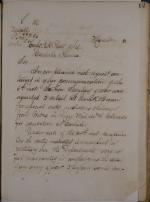
In this letter the Commissioner of Indian Affairs R. E. Trowbridge was responding to a from Indian Agent A. B. Ludlam of the Pima and Maricopa Agency's request for the education of three Pima boys at the Hampton Institute instead of at Forest Grove Industrial Training School in Oregon. Trowbridge explains that the climate is not much colder…
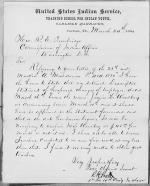
Richard Henry Pratt states that he has had trouble finding quality teachers but recently found Jennie L. Woodbury, who started on March 11 for $45 per month. Pratt strongly urges Commissioner of Affairs R. E. Trowbridge to approve this hire and wage.
Note: This item was copied from U.S. National Archives microfilm reels (M234), which…
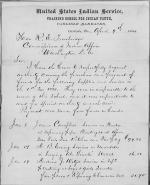
Richard Henry Pratt requests Commissioner of Indian Affairs R. E. Trowbridge's approval for purchases made during the first quarter of 1880 amounting to $1,163.59. The purchases were not covered on the quarter's estimate of funds but were "indispensable" to the Carlisle Indian School, so Pratt purchased them with money on hand.
Note:…
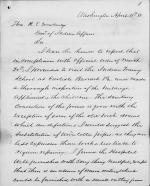
George Kellogg of the Medical Division of the Bureau of Indian Affairs provides a sanitary report on the buildings, appliances, and children at the Carlisle Indian School. He recommends replacing some old brick drains with terra cotta pipes. He finds the buildings to be of a satisfactory condition, particularly commending the hospital - though…
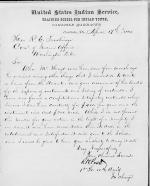
Richard Henry Pratt informs Commissioner of Indian Affairs R. E. Trowbridge that when the late and former Commissioner, E. A. Hayt, visited the school several months ago, he recommended that Pratt hire an instructor and start a student band at the Carlisle Indian School. Pratt has finally found an instructor and requests Trowbridge's approval…
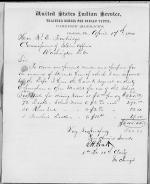
Richard Henry Pratt requests authority to purchase 300 dining room stools, 72 desks, 30 rear seats, and 5 teacher's desks amounting to $545
Note: This item was copied from U.S. National Archives microfilm reels (M234), which were filmed from the original documents found in Record Group 75, Entry 79, "Letters Received by the Office of…
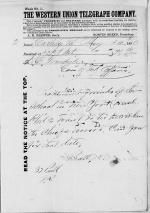
Richard Henry Pratt asks Commissioner of Indian Affairs R. E. Trowbridge to set the date when chiefs visit the Carlisle Indian School so that "friends of the school" can visit at the same time.
Note: This item was copied from U.S. National Archives microfilm reels (M234), which were filmed from the original documents found in Record…
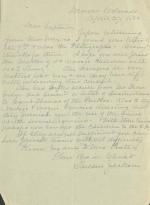
Rev. Sheldon Jackson continues correspondence with Pratt regarding bringing Navajo and Pueblo students to Carlisle. He notes that "the Navajoes are very restless just now & we may have difficulty in security their consent."
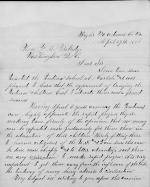
Andrew J. Koser informs Commissioner of Indian Affairs R. E. Trowbridge that he visited the Carlisle Indian School, which he thinks is a "grand success" and more effective than reservation schools. He proposes the idea of purchasing the building formerly housing the Soldiers and Orphans Homestead in Gettysburg to establish a new Indian boarding…
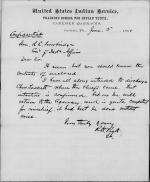
Richard Henry Pratt encloses a copy of a letter from B. F. Beveridge to Charles Tackett about how to ensure that the Indian chiefs while visiting Washington D.C. stay at the Washington House (Beveridge's establishment). In his cover letter, Pratt informs the Commissioner that he intends to discharge Charles Tackett but thinks it should be done…
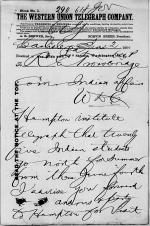
Richard Henry Pratt sends a telegram to Commissioner of Indian Affairs R. E. Trowbridge regarding 25 Hampton Institute students going north for the summer.
Note: This item was copied from U.S. National Archives microfilm reels (M234), which were filmed from the original documents found in Record Group 75, Entry 79, "Letters Received by…
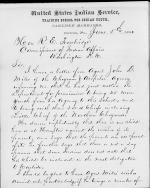
Richard Henry Pratt informs Commissioner of Indian Affairs R. E. Trowbridge that the Cheyenne & Arapaho Agent John D. Miles would like to send 25 students from his agency to the Carlisle Indian School. Miles added that he'd like several chiefs, including Northern Cheyenne Chief Little Chief, to accompany the party of students and that the…
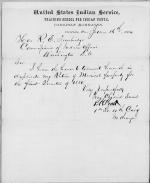
Richard H. Pratt transmits to Commissioner of Indian Affairs R. E. Trowbridge his Return of Medical Property form for the first quarter of 1880.
Note: This item was copied from U.S. National Archives microfilm reels (M234), which were filmed from the original documents found in Record Group 75, Entry 79, "Letters Received by the Office…
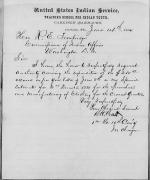
Richard Henry Pratt requests Commissioner of Indian Affairs R. E. Trowbridge's authority to spend $250 to purchase and manufacture clothing for the current quarter.
Note: This item was copied from U.S. National Archives microfilm reels (M234), which were filmed from the original documents found in Record Group 75, Entry 79, "Letters…
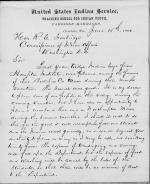
Richard Henry Pratt informs Commissioner of Indian Affairs R. E. Trowbridge that he would like students to have outings on farms located in Berkshire and Hampshire counties in Massachusetts. According to Pratt's plan, the Bureau of Indian Affairs would pay for the students' transit while students would pay for their food and washing expenses.…
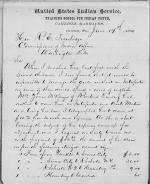
Richard Henry Pratt informs the Office of Indian Affairs that he hired Zoe McKenzie to serve as an interpreter and assistant matron when he brought Sioux students to the Carlisle Indian School in 1879. Pratt notes that he paid her a monthly salary of $10 and covered her expenses and requests authority from Commissioner of Indian Affairs R. E.…
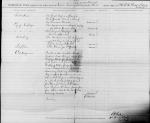
Estimate of funds for the third quarter of 1880 amounting to $8,805 for areas covering subsistence, employee pay, clothing, supplies, and contingencies. Two explanatory cover letters are attached.
Note: This item was copied from U.S. National Archives microfilm reels (M234), which were filmed from the original documents found in Record…
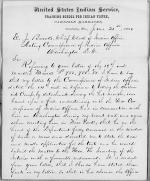
Richard Henry Pratt writes to Acting Commissioner of Indian Affairs E. J. Brooks regarding Brooks' decision to not allow Pratt to purchase tents or take his students to camp in the mountains over the summer. Pratt tells Brooks that he had already discussed the plan with Commissioner R. E. Trowbridge, who was very receptive to the idea, and…
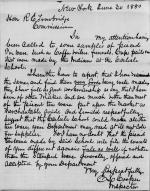
Inspector E. C. Cooper informs Commissioner of Indian Affairs R. E. Trowbridge that he's inspected tinware samples, like coffee boilers, funnels, cups, and pails that were made by Carlisle Indian School students and finds that they're as good, if not better, than the tinware that the Bureau of Indian Affairs uses. Cooper requests that the…
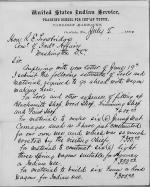
Lieutenant in Charge Richard H. Pratt submits an estimate of tools and material amounting to $1,400 needed for the Carlisle Indian School to build wagons and carriages.
Note: This item was copied from U.S. National Archives microfilm reels (M234), which were filmed from the original documents found in Record Group 75, Entry 79, "Letters…
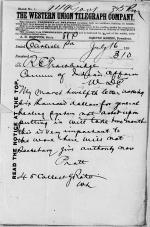
Richard Henry Pratt writes to Commissioner of Indian Affairs R. E. Trowbridge regarding a delay in approval for his request for a $6,000 general heating system at the Carlisle Indian School.
Note: This item was copied from U.S. National Archives microfilm reels (M234), which were filmed from the original documents found in Record Group…
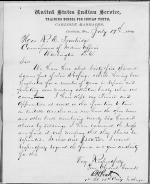
Richard Henry Pratt requests $350 to paint the tin roofs on the Carlisle Indian School's buildings. Pratt adds that the roofs have been in disrepair since the school began.
Note: This item was copied from U.S. National Archives microfilm reels (M234), which were filmed from the original documents found in Record Group 75, Entry 79, "…
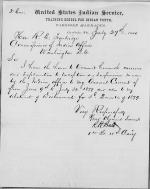
Richard Henry Pratt forwards answers and explanations to the Office of Indian Affairs' exceptions and suspensions on his accounts for June-July 1879 and the third quarter of 1879.
Note: This item was copied from U.S. National Archives microfilm reels (M234), which were filmed from the original documents found in Record Group 75, Entry 79…
